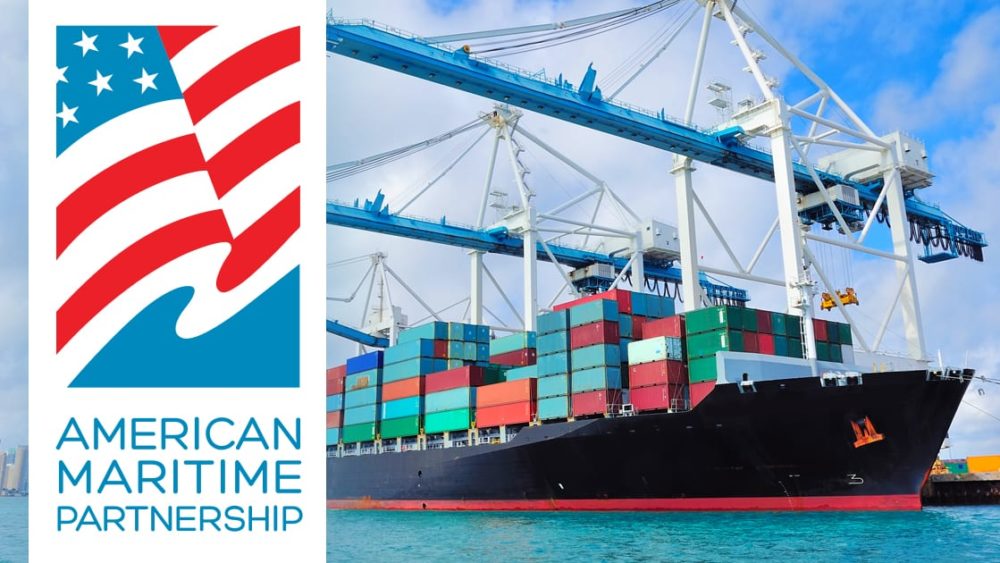- Jenniffer González Colón, Resident Commissioner: Per U.S. Coast Guard, FEMA, Army Corps of Engineers, and the U.S. Department of Energy: “[t]here is an adequate supply of fuel on the Island that is available to consumers”
- Puerto Rico Port Director: “There is no problem with the Jones Act because Puerto Rico has even received more than 600,000 gallons of diesel from foreign vessels in the past two weeks”
WASHINGTON – The American Maritime Partnership (AMP), the voice of the domestic maritime industry, today released the following facts and statement proudly reporting the role of the domestic American Maritime industry in answering the call to help Puerto Rico in the wake of Hurricane Fiona and challenging the theatrics of a foreign oil company to take advantage of the crisis.
“American Maritime has been meeting and exceeding the needs of Puerto Rican residents in the wake of Hurricane Fiona and there continues to be absolutely no justification for a waiver of the Jones Act, as the U.S. Coast Guard, FEMA, the Corps of Engineers, and the U.S. Department of Energy all have made clear that the supply of fuel to the Island is not an issue. This stunt by a foreign oil company showing up unannounced in Puerto Rico while on its way overseas hoping to sell its fuel at a premium to Puerto Ricans in need, and thereby triggering a public and political rush to judgment, is bad precedent, a circumvention of U.S. law, and should never be tolerated. American Maritime is dedicated to Puerto Rico and while foreign oil traders seek to line their pockets at the expense of the Puerto Rican people, we will always be committed to our fellow citizens, including our own employees and their families, in Puerto Rico.” – Ku’uhaku Park, President of the American Maritime Partnership
Key Facts:
- There is no evidence that there is a diesel supply problem on the Island. Distribution throughout the island once fuel is offloaded remains the issue.
- The U.S. Coast Guard informed CBS that Puerto Rico and the U.S. Virgin Islands were “comfortably supplied” with diesel as of September 26, when the BP vessel was camped outside of U.S. territorial waters.
- Jenniffer González Colón, Resident Commissioner, stated:
“At each and every meeting, I have been assured by federal agencies, including the Department of Energy, FEMA, and the Corps of Engineers that there is an adequate supply of fuel on the Island that is available to consumers and that subsequent delivery is planned of more fuel in the short, medium and long term.”
-
- Puerto Rico Ports Authority Director, Jose Piza, in an interview shared that Puerto Rico has received more than 600,000 gallons of diesel from foreign vessels (that followed America’s cabotage laws) in the past two weeks. It is perfectly legal for foreign vessels to deliver foreign cargoes to Puerto Rico. This and cargoes delivered this week dwarf the BP vessel’s cargo.
- Like in the aftermath of Hurricane Maria, any delay in receiving needed cargoes due to Hurricane Fiona are not because the goods are not getting to the ports. Sources in Puerto Rico have confirmed that, while the maritime supply chain is steady, the land side transportation on the island itself has been slower to react.
- Foreign vessels transporting cargo between two U.S. ports must follow U.S. law.
- Nothing prevents a foreign vessel from a foreign origin from shipping to and from Puerto Rico. But when the foreign vessel ships from a U.S. port to another U.S. port carrying U.S. cargoes, it must follow a legal process.
- Piza added that since BP would otherwise have shipped on Jones Act vessels, the gas giant was acting “merely to sell and not to assist the country in its need, for which it will be BP’s fault that the island is left without the resource” adding that “You cannot create the crisis and then play the victim.”
- Regular deliveries of diesel are continuing from legal foreign imports and from service from American Maritime carriers.
- On September 26, a domestic operator delivered fuel near Aguirre and then in Guayanilla to help provide diesel on the island. More deliveries, both foreign and U.S.-sourced, are scheduled to be delivered this week.
- Regular supply chain deliveries of fuel are done in a manner that maximizes efficiency and swift delivery and offloading. The deliveries are timed to ensure there is adequate storage capacity for offloaded fuel when a vessel arrives.
- Delivering fuel by an unexpected foreign vessel to take advantage of recovery from a natural disaster would require those vessels to anchor off the port for days at a time and could disrupt regular operations.
- This British Petroleum (BP) vessel set sail from Texas City enroute to an overseas destination, never intending to deliver diesel to Puerto Rico. Seeing an opportunity to sell its fuel at a premium and take advantage of Puerto Rican residents, BP redirected the vessel to Puerto Rico without following the U.S. Jones Act waiver process.
For more information, please contact Media@AmericanMaritimePartnership.com
# # #
American Maritime Partnership (AMP) is the voice of the U.S. domestic maritime industry, a pillar of our nation’s economic, national, and homeland security. More than 40,000 American vessels built in American shipyards, crewed by American mariners, and owned by American companies, operate in our waters 24-hours a day, seven days a week, and this commerce sustains nearly 650,000 American jobs, $41.6 billion in labor compensation, and more than $154.8 billion in annual economic output. You can learn more by visiting www.americanmaritimepartnership.com.



Comments are closed.